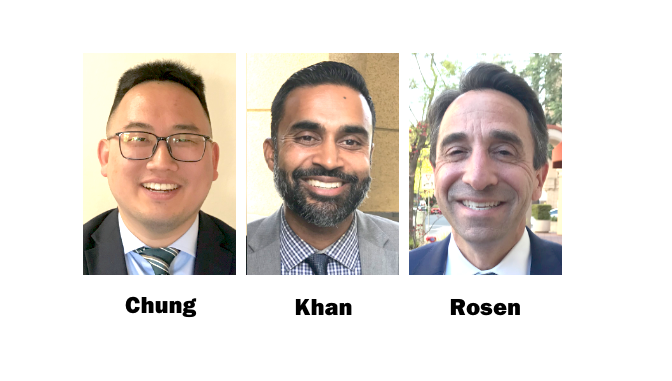
BY BRADEN CARTWRIGHT
Daily Post Staff Writer
It’s been a bitter and divided race for Santa Clara County District Attorney so far. Yesterday (May 4), the Post covered the candidates throwing shots at each other and carving out distinct positions at a debate hosted by the Stanford Law School.
Sajid Khan, a deputy public defender, said he wants to move the DA’s office beyond punishment and address the root causes of crime.
District Attorney Jeff Rosen, in his first contested race since 2010, said he has the right balance and experience, and the criminal justice system is moving in the right direction under his watch.
And Daniel Chung, a former deputy DA who was fired by Rosen last year, said Rosen is dropping the ball with prosecutions because he runs an unethical operation.
Ballots will be mailed out on Monday for the June 7 primary. If nobody gets 50% of the vote, then the top two candidates will face off in November.
Here’s a summary of how they addressed some of the moderators’ questions:
Q: How would you support victims of sexual assault?
Khan: “I was sexually abused as a boy, so I understand the trauma that sexual violence leaves behind. I would expand services for victims, and give them access to support regardless of whether they testify or if their case leads to a conviction.”
Chung: “Khan refuses to say that Stanford rapist Brock Turner should’ve gone to prison. If he can’t say that a rapist belongs in prison, then that disqualifies him.”
Rosen: “I have helped hundreds of sexual assault victims get justice. I created a counseling unit for victims, and I worked to change an outdated law that led to Turner’s lenient sentence.”
Q: How would you address the fentanyl crisis?
Rosen: “I already am. I formed a task force and talked to people in parks about why they take drugs. You have to address demand, by encouraging people to go to treatment, and supply, by busting drug traffickers.”
Chung: “I would encourage police officers to get involved early on. Drug users would go to treatment because they’d rather not go to jail, and drug dealers would be charged with felonies, not misdemeanors.”
Khan: “I would be curious about why people take drugs and try to address those root causes.”
Q: What would you do about “ghost guns” and gun violence?
Rosen: “My office uses restraining orders to take guns from people with red flags, saving lives and stopping mass shootings. I worked with the White House to pass a law that makes manufacturing ghost guns illegal.”
Khan: “Under Rosen’s watch, gun violence is rising. Most of these crimes are rooted in mental health issues, so we have to move resources away from the ‘criminal punishment’ system and instead invest in schools and mental health treatment.”
Chung: “My father killed himself with a gun when I was 8 years old, so I agree with Khan that mental health is key. But the DA’ s office can’t do it alone just by cutting its budget. The whole community has to invest in solving the problem.”
Q: How did the Covid pandemic change your ideas of how the DA’s office should run?
Rosen: “Right when the first stay-at-home order was issued, I gave my employees extra laptops to keep us functioning. We released more than 1,000 inmates early from jail.”
Chung: Covid showed how important modern IT is, and Rosen has failed to modernize his software. Prosecutors aren’t notified when a defendant is re-arrested, and they can only view one document at a time. While some prosecutors were having a blast working from home, I was in court every day — before masks and vaccines.”
Khan: “Covid highlighted the inhumanity of our jails, which were overfilled and put people at risk of death. Zero bail proved that we could let people out of jail without making them pay, and Rosen doesn’t deserve credit for that because the state changed the law.”
Q: How should the DA’s office hold police officers accountable?
Chung: “Some of my most heated discussions are with law enforcement. I explain what the law allows, and what officers shouldn’t do. I would make the Brady List, which names officers who have lied, readily available to prosecutors. Rosen is backed by the lion’s share of police unions, so he has a conflict of interest.”
Rosen: “My relationship with police officers is collaborative, not cozy. I’ve prosecuted 60 police officers for a range of crimes, including the county undersheriff.”
Khan: “I started my career and ran for DA because I am committed to holding police accountable when they violate the law. Rosen has abdicated his role by not prosecuting a single one of 22 police officers who have killed a person in San Jose, leaving families without justice.”
